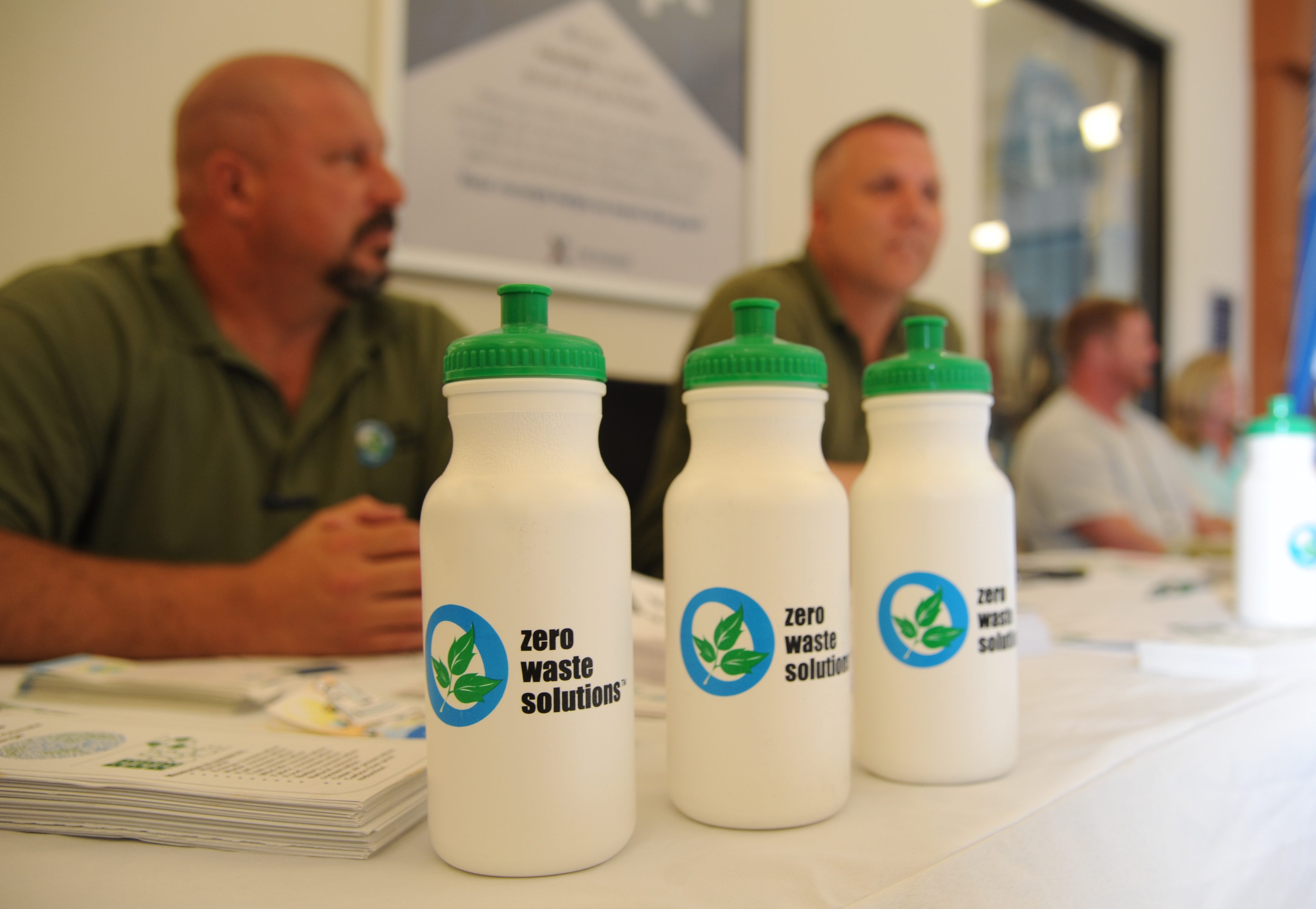by Angelica Cotto
Every day, people use plastic. Whether that’s plastic water bottles, straws, utensils, or even plastic bags on campus, plastic has become a nationwide issue because it currently infests our planet—our oceans especially—and it is not biodegradable. Zero waste is somewhat of a new phenomenon in which people make it their mission to produce less waste. This is done by recycling, reusing items, or simply reducing all waste possible. I follow simple and cost-effective ways to avoid using plastic on campus by converting to a zero-waste lifestyle, and it’s a lot easier than you may think.
As a student, I tend to struggle with remembering to bring my reusable water bottle with me sometimes—or worse, I forget to fill it up. There are ways around this, but I find making it a daily task to fill and travel with your bottle is the best practice. The number of vending machines on campus are tempting with all of the options available to us. However, if we continue to let our temptations get the best of us, then our planet will suffer. Not only is bringing a reusable water bottle extremely helpful when walking around campus in this heat, but it will save you time, money, and overall effort of finding a vending machine. Also, who doesn’t want to be healthy by drinking water all day? I found that bringing my own reusable water bottle is like a commitment to drinking more water. That’s definitely a bonus to our stressful lives, since you no longer have to worry about your water intake this way!
Plastic bottles can end up everywhere if we’re not careful with recycling properly. However, there is another waste of plastic that can travel fairly easily: plastic bags. Plastic bags are infesting our planet, whether it is floating in the wind or in the ocean. So far, with the use of plastic items, our oceans and marine life are slowly dying and becoming overpopulated by plastic.
According to Clean Water Action, “Marine plastic pollution has impacted at least 267 species worldwide, including 86% of all sea turtle species, 44% of all seabird species, and 43% of all marine mammal species.”
As heartbreaking as this is, there is a solution to this plastic dilemma: reusable bags. I always make sure to have one in my backpack when purchasing food or supplies on campus. Reusable bags are especially helpful when reducing waste: think of all the times you purchase something in a store per week. Whether you’re buying books or simply buying groceries, use a reusable bag to avoid plastic waste! If we choose to continue to purchase and use plastic products, marine animals and birds are constantly in danger of having plastic in their system or around their necks. We can avoid further harm to wildlife if we ditch the plastic bag.
Living on campus or in off-campus housing is great: there are tons of restaurants in the area and delicious food everywhere you turn. With so many options to choose from, to-go Styrofoam/plastic containers, and of course the to-go bag to go with it, this is yet another wasteful habit we have as college students. I crave to go to Chipotle just like anyone else, but cooking and packing your food at home will not only save your bank account, but also the planet.
Fast food restaurants use many single-use items such as Styrofoam containers, plastic lids, straws, single-use cups, etc. Single-use items are wasteful, and most do not get recycled properly because of how quick we are to receive and discard them. When I pack my lunch for the day, I use any glass container I have. If you’re worried about eating cold food, there are multiple microwaves on campus to use. They are located in HPA1 on the first floor, All Knight Study, Engineering 1, and on the second floor of Student Union. If we don’t at least try to pack our lunches, the single-use items from restaurants will continue to build up in our landfills and infest the ocean. When bringing your lunch on campus, do not forget your utensils! Single-use utensils end up in our oceans, harming wildlife and cluttering the ocean floor. There are alternatives to plastic utensils and they are in your own dorm or apartment! I try my best to keep a set of utensils in my lunch box at all times, because according to One Green Planet, “6 million tons of nondurable plastics, like spoons, forks, and knives are discarded” and in turn harm wildlife tremendously.
The most infamous and wasteful habit that I am even guilty of is a nice, hot cup of joe every morning from Starbucks, Café Bustelo, or Dunkin’ Donuts. Coffee is a must for most students. When you’re having a rough morning and you spot a Starbucks, just remember to bring a reusable mug beforehand.
According to The Seattle Times, “58 billion paper cups are thrown away each year in the United States.”
When ordering your coffee, tell the barista that you brought your own coffee mug and to please pour your delicious hot drink into your sustainable and reliable mug. Baristas will give you a special discount on your coffee just for bringing your own mug—so cost-efficient! This saves waste from Styrofoam cups, plastic lids, stirrers, and cozies.
Another common, small item we use daily are plastic straws. Plastic straws and plastic lids come with any drink that you get at a fast-food restaurant around campus. According to the National Park Service U.S. Department of the Interior, “Americans uses over 500 million plastic straws every day.” Although straws may seem small, they create negative impacts on our environment. When straws are not recycled properly, they end up in landfills, which then end up in our oceans! You can avoid these pesky plastic straws by requesting no straws with your drinks, or purchasing a metal, durable, reusable one for everyday use. However, if you want to help the planet in great ways with less money, just drink without one.
I understand that sometimes zero waste can be difficult when we have so many other things to do and think about, so if you do give in to using plastic, just know that UCF has recycling “stations” in almost every building. So if you did buy a soda or are chugging a Red Bull before a test, please stop by these stations and recycle the can!
Instead of throwing away cans, water bottles, Styrofoam to-go containers, or any plastic utensils on campus, recycle them instead! If you are ever unsure of whether something can be recycled on campus, you can always visit http://fo.ucf.edu/recycle. If you tend to spend most of your time in your dorm or off-campus housing, then contact Department of Housing and Residence Life or your landlord for more information on recycling near you. If you struggle with recycling because of your living situation, or you simply forget then decline using any plastic and Styrofoam options wherever you go. As mentioned earlier, there are plenty of alternatives to single-use items that will assist with reducing the trash around our planet.
The overall goal of becoming zero waste is to lessen the trash that currently pollutes this earth. Zero waste focuses on three components: reduce your waste, reuse items, and recycle everything that can be recycled properly. There is simply far too much plastic polluting our water, air, and land, and it is our responsibility to take care of one another. Plastic is a durable material to use, yet it is very harmful to our planet since it is extremely difficult for it to decompose (it is somewhat indestructible). If we stick together as a student body to lessen our waste, then there will be less plastic waste in your car, your dorm, your apartment, our campus, our land, our oceans, and eventually, the planet.






